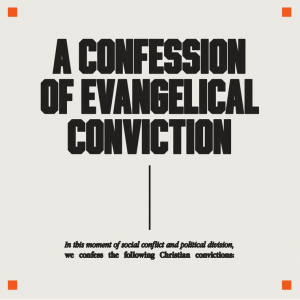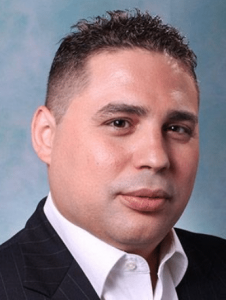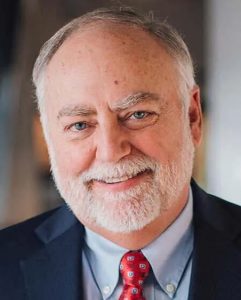A new confession of conviction to counter the politicization of evangelical congregations will generate pushback from Christians convinced their preferred political candidates are chosen by God, faith leaders said during an online briefing about the document.
The “Confession of Evangelical Conviction” also aims to inspire evangelicals to publicly proclaim their loyalty to Jesus Christ, to serve as theological backing for beleaguered pastors and to set an example of faith for a younger generation of Christians, its signers said.

Skye Jethani
But it’s not going to be a popular statement to evangelicals who have elevated party and nation above gospel teachings, said Skye Jethani, author, speaker and co-host of “The Holy Post” podcast.
“This statement is designed to hold up a mirror to those who read it and reflect back either the image of Jesus or the image of their partisan idolatry,” Jethani explained during the Sept. 9 Zoom call featuring six other national evangelical leaders involved in the document.
“Ultimately, this is a moment for us all to take stock of where our allegiances lie. Who’s teaching and what teaching are we really called to pursue in this world? And if it’s not the teachings of Jesus and if it’s not the values of his kingdom, then maybe we shouldn’t be calling ourselves his followers,” Jethani said.
The confession presents seven convictions central to fostering revival and civic renewal, beginning with “We give our allegiance to Jesus Christ alone.” Numerous Scripture passages affirming the supremacy of God and Scripture are provided to support that top value.
“We reject the false teaching that anyone other than Jesus Christ has been anointed by God as our Savior.”
“We reject the false teaching that anyone other than Jesus Christ has been anointed by God as our Savior, or that a Christian’s loyalty should belong to any political party,” it says. “We reject any message that promotes devotion to a human leader or that wraps divine worship around partisanship.”
“We will lead with love, not fear” follows with biblical reminders that Jesus never will abandon his people: “We reject the stoking of fears and the use of threats as an illegitimate form of godly motivation, and we repudiate the use of violence to achieve political goals as incongruent with the way of Christ.”
The truth of Scripture and its warnings against bearing false witness also are affirmed: “We reject the misuse of holy Scripture to sanction a single political agenda, provoke hatred or sow social divisions, and we believe that using God’s name to promote misinformation or lies for personal or political gain is bearing his name in vain.”
 Belief in the gospel’s healing power over world divisions also is affirmed, as is God’s care for every nation and race: “We reject any attempt to divide the church, which is the body of Christ, along partisan, ethnic or national boundaries, and any message that says it is God’s desire for the human family to be perpetually segregated by race, culture or ethnicity is a rejection of the gospel.”
Belief in the gospel’s healing power over world divisions also is affirmed, as is God’s care for every nation and race: “We reject any attempt to divide the church, which is the body of Christ, along partisan, ethnic or national boundaries, and any message that says it is God’s desire for the human family to be perpetually segregated by race, culture or ethnicity is a rejection of the gospel.”
A commitment to the church’s prophetic mission of sharing the gospel and bringing social and racial reconciliation is another key conviction affirmed: “We reject both the call for the church to withdraw from societal issues out of fear of political contamination, as well as any attempt to distort the church into a mere vehicle of political or social power.”
The sixth conviction states, “We value every person as created in God’s image.” That belief compels Christians to act with mercy and love toward all people because they are made in God’s image, the document says. “We reject any messages that employ dehumanizing rhetoric, that attempt to restrict who is worthy of God’s love, or that impose limitations on the command to ‘love your neighbor’ that Christ himself removed.”
The final conviction is the pledge to “recognize godly leaders by their character” including by evaluating them by the fruit of their actions: “We reject the lie that a leader’s power, popularity or political effectiveness is confirmation of God’s favor, or that Christians are permitted to ignore the teachings of Christ to protect themselves with worldly power.”
“We reject the lie that a leader’s power, popularity or political effectiveness is confirmation of God’s favor.”
The statement concludes with a resolution to uphold the gospel regardless of cultural shifts or political pressures: “We commit to being a light in the world, and faithful witnesses to the transforming power of Christ’s love. We pray that God’s Spirit will revive our church and strengthen Christ’s people to be agents of his presence and blessing in this turbulent age.”
Among the more than 375 initial signers of the confession are scores of pastors, scholars and other evangelical leaders from across the theological and political spectrum and represented by the panel of speakers who addressed members of the media. There are no recognizable Southern Baptist leaders among the initial signatories.

Karen Swallow Prior
Karen Swallow Prior, a conservative evangelical who left a professorship at Southeastern Baptist Theological Seminary in 2023 over differences about living out the Great Commission, said she signed the document as an evangelistic act.
“The Bible says that the world will know us by our love, one for another, not by our love for particular political candidates or particular policies, even though those are important,” said Swallow Prior, author of The Evangelical Imagination: How Stories, Images, and Metaphors Created a Culture in Crisis.
The new confession casts a vision transcending the partisanship and fear that defines politicized evangelicalism in the U.S., she said. “Evangelicalism is global, it’s historical. We have always been characterized by our activist spirit. And so of course that includes political efforts, and what makes evangelicals evangelical is we are activists in many different ways. But we also are centered on Christ and his sacrifice for us and on the Bible as our authority for living and on our own sense of the need for converting people and making disciples.”

Gabriel Salguero
The statement also functions to lift up the pastors of divided congregations with Bible studies, sermon ideas and other tools needed to lead their people out of chaos, said Gabriel Salguero, president of the National Latino Evangelical Coalition and pastor of an Assemblies of God church in Orlando, Fla.
“I think we have a catechesis and a discipleship problem where people make political idols out of partisan politics, and this document and the resources are calling us to look more deeply to a Christ-centered and gospel-centered — not partisan-centered — discipleship,” he said.
Many evangelicals have gone far beyond conservative values into vilifying those who oppose their parties and candidates, Salguero added. “Cruelty is not the example of Jesus, and demonizing people who think differently from you is not the example of Jesus. You will see in this confession the affirmation of the centrality of Christ, the centrality of the gospel, that we should not ignore the public sphere or the political sphere, but we should do it from a gospel-centered and a Christ-centered perspective.”

Dan Boone
The confession also is a way for evangelical leaders to push back against the fear that is robbing younger Christians of the peace they should be experiencing from faith in Christ, said Dan Boone, president of Trevecca Nazarene University in Nashville, Tenn.
“I’m watching the impact of a political culture that is based in fear and enemy-making as it is robbing a generation of hope,” he said. “The only way for us to recover the essence of Christianity is the enthronement of Jesus Christ as Lord over all powers so that the church can once again find in our eschatological hope the kind of neighbor love and justice doing and humility that befits the people of Jesus in every way.”

Christina Edmondson
Generation Z Christians have been especially hurt by the politization of faith they have witnessed in those they once considered positive examples of faith, said Christina Edmondson, co-host of the “Truth Table” podcast, a psychologist and former higher education administrator.
“I saw the heartbreak of students who did not recognize their parents, who did not recognize their grandparents, who did not recognize the church that had raised them because instead of this Jesus with an abounding love and holiness and righteousness, they seem to be more like the crowd that was seeking to throw (Jesus) off a cliff,” she explained.

Richard Mouw
Theologian Richard Mouw, former president of Fuller Theological Seminary, said Gen Z evangelicals often feel isolated by the political and religious hostility they witness in their surroundings.
The confession can serve as encouragement to those who feel alone, he said. “There is a younger generation that has a hard time at Thanksgiving dinner, a hard time at other kinds of family gatherings, has a hard time with many of their own generation. We need a pastoral word that goes to them: you are right and Jesus cares deeply about you and keep talking about reconciliation in Christ, keep talking about ways in which we can come together on these very difficult topics.”

Napp Nazworth
The confession is not an effort to convince Christians who have abandoned the politicized “evangelical” identifier to return to using it, said Napp Nazworth, executive director of the American Values Coalition.
“If ‘evangelical’ equals ‘Trump supporter,’ and you don’t want to identify as an evangelical, that makes perfect sense to me. It also works in the reverse if you’re a Trump supporter who identifies as evangelical even if you don’t believe evangelical things,” he said. “Labels aren’t the important things.”


